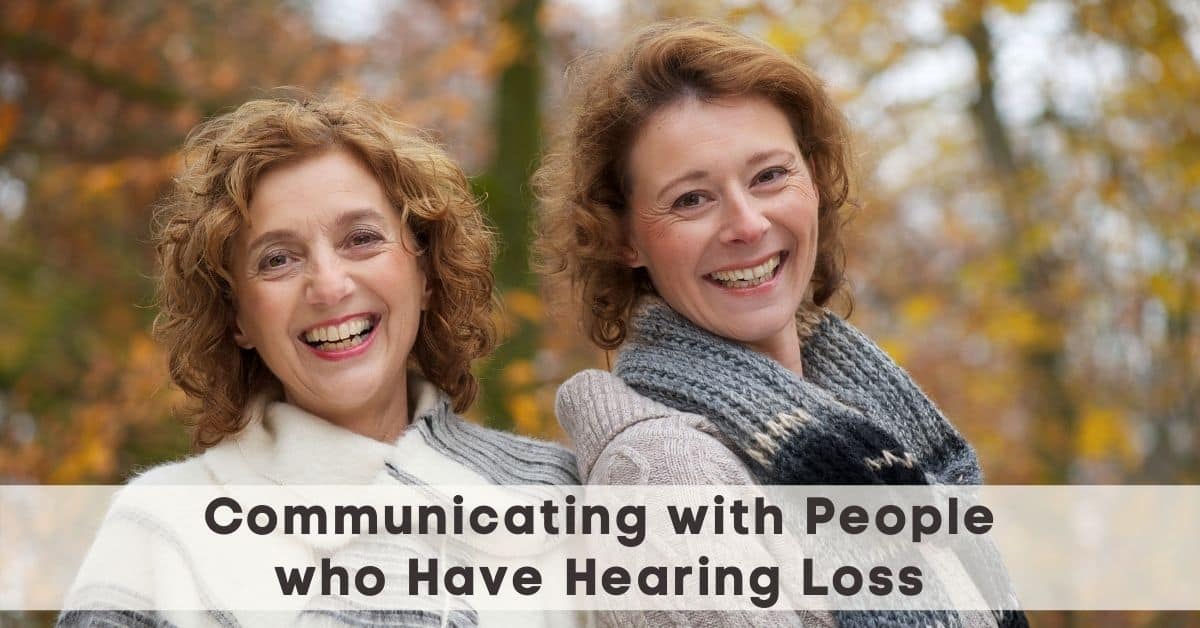A conversation with a person who has hearing loss, like any conversation, is a two-way street. While people who have hearing loss can and do take steps to try to understand speech better, it also requires some effort from the other party. Those who do not suffer from hearing loss might not understand how difficult and exhausting it can be to strain to hear other people. By keeping a few of the following tips in mind, you can help a person with hearing loss to hear you more clearly and make the conversation flow better.
Control the Ambience
If you know you’ll be meeting with a person who has hearing loss, you can plan beforehand to reduce environmental complications. Background noise, darkness and other distractions can make conversation more difficult than it needs to be, so plan accordingly.
Meeting In a Public Place
If you’re planning to meet someone with hearing loss in a public space, try to choose a place that has minimal distractions. Ask the other person if there’s anywhere they prefer to meet: chances are, they’ve found a place or two where background noise is less of an issue.
If you can find a quiet restaurant or bar where they don’t play background music, that’s ideal. Well-lit spaces are best, so try to choose a table or booth by a window and as far as possible from the cash register. Make sure you’ll be able to sit across from one another. A smaller table will help reduce the distance between you, which can be crucial.
Meeting at Home
If you’re hosting someone with hearing loss, you can plan for their visit by making sure you have a well-lit space where you can sit across from one another. Even if this requires rearranging some furniture items, it will help a lot.
Try to set up your meeting space away from the fridge, heaters, or air conditioning units. The name of the game is reducing background noise! You’ll also want to make sure you don’t have the television or radio on when you’re trying to talk. If light is in short supply, make sure it’s shining on your face, not theirs.
Speaking Tips
Some people with hearing loss appreciate it if you modify your speaking style slightly. In cases of mild hearing loss or if the person has a good set of hearing aids, this may not be necessary, but be prepared to make changes in your normal speaking tone if they are asking you to repeat yourself a lot.
- Enunciate clearly. Consonant sounds are tough for a person with hearing loss to distinguish, so their ability to see your face will also be important.
- Speak slowly. Don’t draw out your words, like a slowed down tape, but just leave a little extra space between them.
- Don’t shout. You might have the impulse to speak louder, but shouting can easily distort the mechanical hearing path. A little extra volume is okay, but don’t break above the normal speaking range.
- Don’t exaggerate mouth movements. Many people with hearing loss learn to read lips to some degree, and exaggerating your mouth movements will actually complicate the picture.
Conversational Tips
In addition to speaking a little differently, there are ways you can drive the conversation that will make it easier to follow. People with hearing loss often need to compose complete sentences out of the fragments they receive from their ears, so they’re doing extra mental work while listening to you. Try these tips for getting the right energy going:
- Say their name or otherwise make sure you have their attention before speaking. It can take a minute for them to start focusing on listening, so in addition to making sure they’re ready and able to hear you, this will give them a second to mentally prepare to listen.
- Avoid using complex sentences or rambling. Pause to check in and make sure you’re being understood as you introduce each new concept.
- When asked to repeat yourself, rephrase the concept rather than simply saying the same words again. This will give a person with hearing loss some extra context clues to work with as they try to parse what you’re saying.
- Take turns and don’t interrupt!
Hearing Aids Can Help
If you know someone who struggles with hearing loss and isn’t wearing hearing aids, talk to them about making an appointment for a hearing test. Hearing aids have come a long way and can drastically reduce the problems they’re having in conversation.

